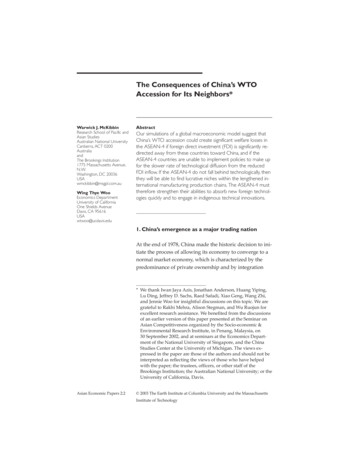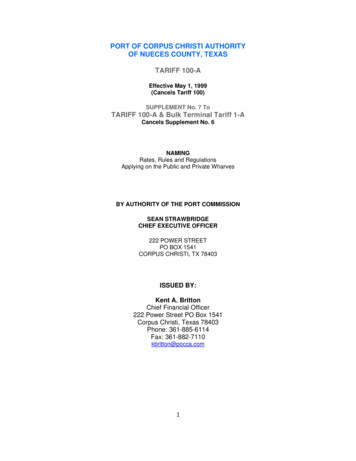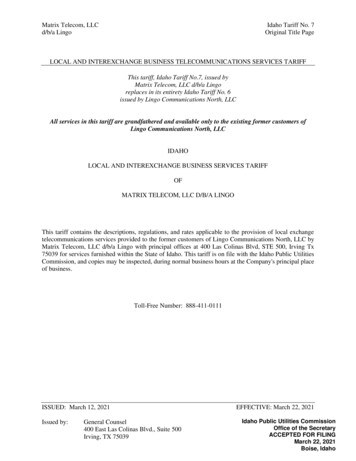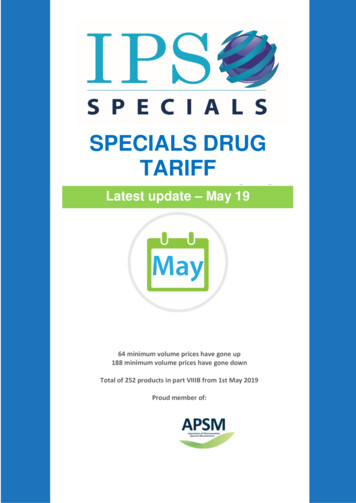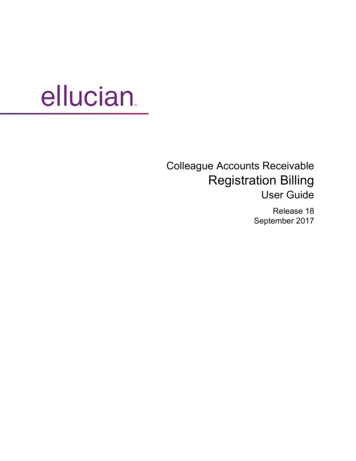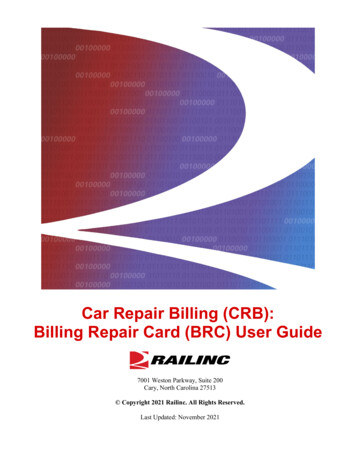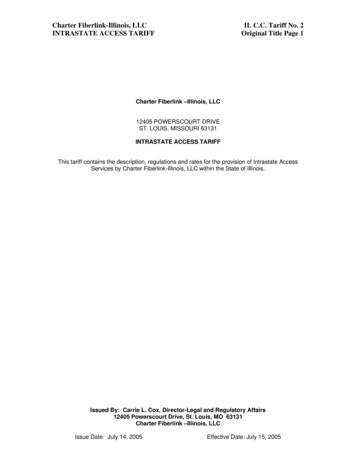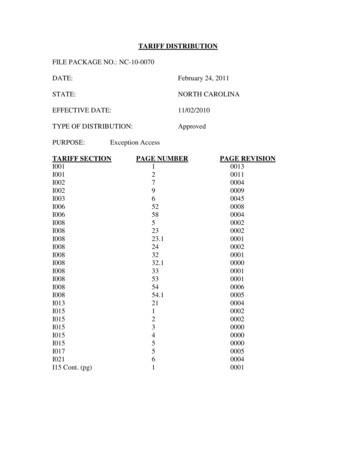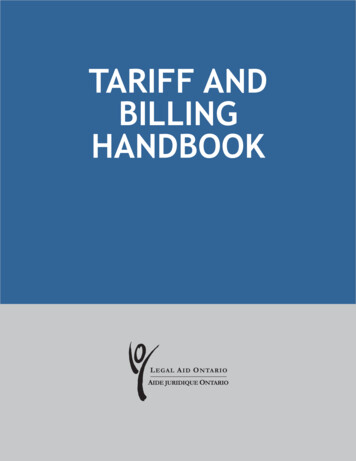
Transcription
TARIFF ANDBILLINGHANDBOOK
Table of contentsSectionTitleTariff and billing handbookPageAuthor1. Introduction1.1 Legal Aid Ontario’s Statement of Principles1-21.2 About this handbook .1-51.3 Resources for lawyers .1-61.4 Accepting certificates .1-91.5 Refusing certificates .1-101.6 Legal aid service standards .1-101.7 Contacting the district office .1-101.8 Expired and cancelled certificates .1-101.9 Change of lawyer .1-131.10 Other legal aid policies .1-131.11 French language services .1-162. Hourly tariff and block fee billing2.1 Certificate .2-22.2 Renumeration .2-42.3 Account payment timelines .2-82.4 General rules and practices .2-92.5 Billing procedures .2-14Legal Aid Ontario: Tariff and billing handbookLegal Aid Ontario: LawyerServices & PaymentsPublished:October 2007UpdatedOctober 2021Legal Aid Ontario40 Dundas Street West,Suite 200Toronto, Ontario M5G 2H1Toll-free: 1-800-668-8258Email: info@lao.on.caWebsite: www.legalaid.on.caCe document est disponibleen français.Legal Aid Ontario receivesfinancial assistance from theGovernment of Ontario, theLaw Foundation of Ontario,and the Government ofCanada.i/v
SectionPage2.6 Billing deadlines .2.7 Billing interim, final or supplementaryaccounts .2.8 Discretion payments in exceptionalcircumstances .2-172-192-212.9 Questioning the settlement of an account .2-332.10 Block fees .2-342.11 Who can bill block fee matters .2-673. Criminal tariff3.1 Introduction .3-23.2 Tariff maximums .3-33.3 Summary conviction offences or Crownelection offences where the matter proceedssummarily (except sexual assault) .3.4 Indictable Type 1 offences, Crown electionoffences where the matter proceeds byindictment, and all offences of sexual assaultregardless of Crown elections .3-43-63.5 Indictable Type 2 .3-73.6 Appellate proceedings .3-73.7 Additional information .3-83.8 Criminal case management .3-193.9 Big Case Management .3-233.10 List of offences .3-23Legal Aid Ontario: Tariff and billing handbookii / v
SectionPage4. Civil tariff4.1 Tariff maximums .4-24.2 General notes .4-24.3 Family law tariff .4-44.4 Family law .4-74.5 Child protection tariff (CYFSA) .4-84.6 Child protection and case management .4-104.7 Child protection .4-104.8 Trials, references and hearings .4-114.9 Appeals .4-114.10 Immigration and refugee law .4-114.11 Administrative board of tribunals .4-114.12 Third party records applications .4-124.13 Group and test case certificates .4-125. Travel tariff5.1 General .5-25.2 Travel disbursements .5-45.3 Travel for others .5-7Legal Aid Ontario: Tariff and billing handbookiii / v
SectionPage6. Costs and contributions6.1 Introduction .6-26.2 Costs .6-36.3 Settlements and judgments .6-86.4 Contribution agreements .6-116.5 Negotiating a settlement .6-147. Forms7.1 LAO forms library.7-2AcknowledgementsWe would like to acknowledge the many hours of work that have gone into revising thismanual. In particular we’d like to thank all the staff of the Lawyer Services and PaymentsDepartment and Communications department who drafted and reviewed the updatedchapters.LAO contact informationLegal Aid Ontario40 Dundas Street West, Suite 200Toronto ON M5G 2H1Phone: 416-979-2352Toll free: 1-800-668-8258Website: https://www.legalaid.on.caLegal Aid Ontario: Tariff and billing handbookiv / v
Departments Lawyer Service Centre To check on the status of an account Questions about direct deposit /banking information Help with online billing using Legal Aid Online Change of contact information General tariff information Experience level increases Information about review of an account416 979-9934 or 1-866-979-9934 LAO LAW (Research Facility)416-979-1321 or 1-800-265-1392 .on.ca Reciprocity Coordinator (for out of province issues)416-204-4703 Client Account Services (collections) For all inquiries about contribution agreements and liens.Main #, Press “0” during business hours to speak to an operator MentoringSee information on LAO’s website at: egal Aid Ontario: Tariff and billing handbookv/v
1. Introduction
Introduction1.1 Legal Aid Ontario’s Statement ofPrinciplesLAO’s services promote access to justice. We provide legal aid services to eligibleindividuals in Ontario. We are a vital part of a strong justice system.We are committed to our clients, our work and our important role. We have a foundationalframework of values and commitments that we have built over time and which we continueto strengthen. This framework informs our work on a daily basis, and we are proud of it.We are presenting the framework in this statement of principles as LAO transitions fromits founding statute, the Legal Aid Services Act, 1998, to updated legislation, the LegalAid Services Act, 2020. Our principles and commitments are part of our strong tradition ofservice and they will continue to be foundational to our work under our new statute. Thistransition is an opportunity for us to reaffirm and to celebrate our principles.Applying our principlesWe put clients at the centre of all we do.We deliver client-focused services in accordance with our mandate and the principlesestablished in LASA, 2020. We are accountable to the province of Ontario for ensuringvalue for money in the expenditure of public funds.As set out in LASA, 2020, LAO’s mandate is to provide high-quality legal aid servicesthat consider the needs of clients and communities in Ontario, including Indigenous andFrancophone individuals and communities. We must also be mindful of the cost of theservices and our financial resources.Our statutory principles are in s. 17(2) of LASA, 2020, which says that LAO should makecontinual efforts to maintain and improve the effectiveness and quality of legal aid serviceswhile ensuring value for money and that legal aid services should: promote access to justice be efficient, effective and high-quality be provided in a client-focused, innovative, transparent and accountable manner, be responsive to the needs of low-income individuals and disadvantaged communities inOntario, promote early resolution, where appropriate, anLegal Aid Ontario: Tariff and billing handbookCh.1-2 / 16
Introduction be co-ordinated with other aspects of the justice system and with community services.Equity and human rightsLAO strives to uphold the values of equity, diversity, and inclusion within our organizationand in our client services.As a provider of services to low income Ontarians—many of whom are Indigenous, Black,racialized, and members of other equity-seeking communities—we recognize that ourclients face barriers in accessing justice because of systemic racism and other forms ofdiscrimination, such as those faced by people with disabilities and who are 2SLGBTQIA .LAO works to combat these impacts by: respecting and advancing the principles of equity and human rights following the letter and spirit of the Ontario Human Rights Code providing legal aid services through service providers who are respectful, recognize thedignity and worth of every client, and are free of bias, discrimination, harassment, andracism, including anti-Indigenous and anti-Black racism applying an equity analysis, including race equity, to our work strengthening our organizational capacity and client services by fostering an inclusiveand diverse workplace that reflects the clients and communities we serve.LAO actions these values in a variety of ways: We have implemented a client-centred approach for reducing barriers and improvingservice quality for our core clients, including individuals and communities who areIndigenous, Black, or racialized, and people with disabilities. We are committed to working with Indigenous communities and the provincial andfederal governments to advance the goals of truth and reconciliation and to implementthe Truth and Reconciliation Commission of Canada’s Calls to Action, particularly thoseaddressed to the justice community. LAO’s rules and policies require service providers and staff to deliver services in amanner that is respectful, recognizes the dignity and worth of every client, and is free ofbias, discrimination, harassment, and racism, including anti-Indigenous and anti-Blackracism. We have established an equity, diversity and inclusion committee. We value the broadrange of diversity in our staff, service providers, stakeholders and clients across Ontario,and are committed to building inclusion and supporting equity and a sense of belonging.Legal Aid Ontario: Tariff and billing handbookCh.1-3 / 16
IntroductionThrough the committee, LAO has developed a multi-year strategic plan to addressbarriers and move LAO closer to its vision.LAO’s values and strategic goalsOur values are leadership, excellence, creative thinking, and respect. We lead by being astrong voice in representing our clients and promoting access to justice. We continuouslywork to improve what we do. We respect our clients, our service providers and all otherswith whom we interact.Our strategic goals include: a client-centred focus value for money innovative services engaged staff, and effective collaboration.We advance these goals by: focusing on client-centred service delivery supporting the community legal clinic system, Indigenous legal services organizationsand student legal services organizations in serving legally-aided clients and communities listening to our clients, service providers and staffAccessibilityWe are committed to a proactive approach to accessibility in communication andcustomer service by developing and implementing accessibility policies and procedures inaccordance with the Accessibility for Ontarians with Disabilities Act, 2005.Our Accessibility Policy sets out LAO’s policies and procedures to promote the coreprinciples of dignity, independence, inclusion, integration, responsiveness and equality ofopportunity for people with disabilities.Legal Aid Ontario: Tariff and billing handbookCh.1-4 / 16
IntroductionFrench Language ServicesWe are committed to meeting the needs of French-speaking clients and ensuring that legalaid services are readily available in French, in keeping with the principle of active offer andin accordance with Ontario’s French Language Services Act (FLSA).LAO’s French Language Services (FLS) strategic plan, created as part of the overall FLSStrategic Plan for the Justice Sector in Ontario, sets out our ongoing commitments andpriorities for FLS.Service providersLAO carries out its mandate with the dedication and commitment of its staff and its serviceproviders, including roster lawyers who deliver legal aid services, community legal clinics,Indigenous legal services organizations, and student legal services organizations.They share our commitment to serving low-income individuals and disadvantagedcommunities in Ontario. Each individual and organization plays an integral part in helpingLAO to deliver on its mandate. We value their work, the important role they play, and therelationships we have with them.1.2 About this handbookWho is it for?This handbook is intended for lawyers and their staff, to outline the policies and proceduresfor legal aid billing and the legal aid tariff. The handbook is for lawyers who are alreadyroster members (duty counsel and/or certificate). If you have not yet registered for rostermembership, please contact your local Director-General at the Legal Aid office.What’s in it?This handbook is a plain language interpretation of the rules and schedules. For moredetailed information on the regulations and schedules, see the following documents: The Legal Aid Services Act, 2020 The Rules, Schedules and PoliciesLegal Aid Ontario: Tariff and billing handbookCh.1-5 / 16
IntroductionWhere to look?The handbook contains detailed information about certificate billing rules, including dailyand annual limits and billing deadlines. It also contains individual chapters for Criminal Lawand Civil Law detailing the tariff maximums in each area of law.For rules and requirements for billing disbursements please refer to the Disbursementshandbook.The Costs chapter discusses the lawyer’s obligations in regard to costs recovered orawarded, statutory charges and settlements. It also outlines the lawyer’s responsibilities interms of the client’s contribution agreement with Legal Aid Ontario. For information on DutyCounsel requirements and billing rules, access the LAO Web site at www.legalaid.on.ca.For more informationFor more information about this handbook, please contact:Lawyer Service CentreLegal Aid Ontario40 Dundas St. West, Suite 200Toronto, ON M5G 2H1Telephone: 416-979-9934 or 1-866-979-9934Fax: 416-979-7326.1.3 Resources for lawyers1.3.1 LAO LAWLawyers acting on legal aid certificates have access to research and resources throughLAO LAW’s web site. Materials are available in aboriginal, correctional, criminal, family,immigration & refugee law, and mental health law. General memoranda of law, factums,and other legal materials are provided free of charge to practitioners who are active LAOroster members.In addition, LAO LAW publishes both weekly case summaries and a newsletter of currentcriminal, family law and refugee law developments. The case summaries (The BottomLine) and newsletter (LAW@LAO) are available to roster members by email subscription(through the web site) and are also found on the web site itself.Legal Aid Ontario: Tariff and billing handbookCh.1-6 / 16
IntroductionResearch focusing on legal issues arising in the context of a particular legally-aided client’scase is available upon request.To contact LAO ess:LAO LAW, Legal Aid Ontario40 Dundas St. West, Suite 200Toronto, Ontario M5G 2H1Telephone:416-979-1321 or toll free at 1-800-265-1392Fax:416-979-89461.3.2 Mentor serviceLAO provides a mentor service to assist less experienced lawyers who represent clientswith legal aid certificates. See LAO’s website at www.legalaid.on.ca for more information.1.3.3 Legal aid district officesLegal aid certificates allow clients to receive legal services from their choice of a privatelawyer or from lawyers employed by LAO at Family Law Offices, Criminal Law Offices andthe Refugee Law Office. The certificate is the lawyer’s guarantee of payment from LAO,subject to the rates and limitations set out in the legal aid tariff.Certificates are available for a variety of legal problems, including specific criminal, family,immigration and refugee matters, and some mental health legal proceedings.Staff at 51 LAO offices across Ontario receive and process client applications and issuelegal aid certificates to financially eligible people for cases that meet LAO’s coverageguidelines. District offices are grouped into regional services division districts which aremanaged by a Director-General. The Director-General or delegate is responsible forauthorizing all legal services on the certificate, and for making any required changes (calledamendments) to the certificate. Amendments to a certificate may include, for example,travel authorizations, coverage for additional charges in criminal matters, or furtherallotments of time in family matters.Legal Aid Ontario: Tariff and billing handbookCh.1-7 / 16
Introduction1.3.4 Lawyer Services and Payments departmentThe central administration of LAO is located at the provincial office in Toronto. The LawyerServices and Payments department at the provincial office is responsible for all aspects ofbilling and payment for lawyers’ certificate and duty counsel services. The department hasthree divisions:1. Lawyer Payments Pays lawyers’ accounts by applying the legal aid tariff to all accounts for workdone by lawyers on legal aid certificates (including enforcing the time limit for thesubmission of accounts); Determines discretionary increases when requested (for hours billed in excess of thetariff maximums); Authorizes disbursements on legal aid certificates (for example, the cost oftranscripts, interpreters and family assessments); Approves the settlement of civil and family law actions, including: waiving LAO’s claim for costs in civil and family litigation; negotiating LAO’s claim for reimbursement from settlement funds obtained by aclient represented on a legal aid certificate.2. Lawyer Service CentreThis call centre is available during normal business hours to provide information andassistance to lawyers and their staff about: status of an account; direct deposit /banking information; online billing using Legal Aid Online; change of contact information; general tariff information; experience level increases.3. Big Case ManagementThis group manages the big case management program for criminal certificateslikely to exceed 20,000. For more information, visit Big Case Management at LAO’swebsite.Legal Aid Ontario: Tariff and billing handbookCh.1-8 / 16
Introduction1.4 Accepting certificatesWhen a client bearing a legal aid certificate contacts you, you can accept or refuse thecertificate. If you accept the certificate, you generally follow these steps:1. Check the certificate to see that it covers the steps that you believe must be taken,and note any conditions or limitations, as well as the certificate’s effective date andtermination date.If you feel that the client needs services that the certificate does not cover, requestan amendment from the Director-General in a timely fashion before performing anyservices.If you wait until after the services are complete, the Director-General may requireevidence of the client’s continuing eligibility to add services to the certificate thatwere not previously authorized. The Director-General may not approve the additionalservices pursuant to legal aid policies.2. If the client does not attend at the Director-General’s office to prove continuing eligibility,or cannot be located, your requested amendment might not be granted.3. If the client has entered into a contribution agreement, note its terms. If the client fallsinto arrears under the agreement, the certificate is cancelled. For more information oncontribution agreements, see Chapter 6: Costs and Contributions.4. Check the tariff that applies to the service to be performed so that you know the feeallowed and the details of the tariff.On each legal aid certificate, the Director-General outlines in broad, general terms thelegal services authorized to be performed on behalf of the client. All civil certificatesset out the number of hours allowed by the tariff for the authorized services. Themaximum number of hours in criminal cases is determined by the type of chargesauthorized, the progress of the case and how the charges are disposed of.5. If you can tell that the services authorized by the certificate in the specific circumstancesof your case are so exceptional or unique that the tariff maximum is clearly not enough,write to the Director-General with a copy to the Lawyer Services and PaymentsDepartment. Your letter should set out the detail of the case and include an estimate ofthe amount of time needed to complete the case. If you do not let the Director-Generalknow that the tariff maximums may be substantially exceeded, the settlement of youraccount could be affected.6. Photocopy the certificate, personally sign the acknowledgement, and return the signedphotocopy to the district office within 90 days of the date of issue. When acknowledgingthe certificate, show whether funds were paid before the certificate effective date.Legal Aid Ontario: Tariff and billing handbookCh.1-9 / 16
Introduction1.5 Refusing certificatesYou do not have to accept the case of every client with a legal aid certificate. You can referthe client to another lawyer, as long as they are roster members and are willing to act.If you do not accept the certificate, return all copies of the certificate to the Director-Generalas soon as possible1.6 Legal Aid Service standards1.6.1 GeneralFor the services standards for lawyers authorized to provide legal aid services, please seeSchedule 1 of the Legal Aid Service Rules.1.6.2 Lawyer referral listLawyers must accept or work on three or more certificates per year to be included onthe referral lists given to clients. This ensures that the referral lists given to clients are upto date and include only those lawyers who are actively accepting legal aid certificates.Director-General may waive the policy for lawyers who are handling major cases or are ona leave of practice. Should you have any concerns about this policy, please contact yourDirector-General.1.7Contacting the District OfficeContact the office for assistance with all issues connected with the certificate: Reinstate an expired certificate; Reinstate/appeal the cancellation of a certificate; Change the effective date of the certificate (the effective date is the date shown on thecertificate indicating the date on which you can begin providing services to the client); Obtain authorization for travel time; without the Director-General’s authorization, no feesor disbursements relating to travel are paid; Obtain an amendment to the certificate;Legal Aid Ontario: Tariff and billing handbookCh.1-10 / 16
Introduction Change your client’s contribution agreement (required when the cost of the legalproceedings exceeds the original estimate); Arranging a settlement conference or a variation conference in a family law matter; Cancel a certificate, with your client’s consent.1.7.1 Change in client’s circumstancesClients might tell you that their financial circumstances have changed, or you mightdiscover it yourself. In either case, you must notify the Director-General. You must alsonotify the Director-General if you find any of the following: The client may have misrepresented their circumstances in applying for legal aid; The client failed to make full disclosure at the time of applying for legal aid; Anything that indicates that the client may no longer be entitled to the certificate.1.7.2 Certificate authorizationsEach certificate authorizes you to perform legal services from a particular date, called theeffective date. Lawyer Services and Payments pays for services provided up to one monthbefore the effective date of the certificate, as long as you have not received any moneyfrom the client privately. For services over one month before the effective date, contact theDirector-General to request that the certificate be backdated to the first date of services.If the certificate is cancelled, you are no longer authorized to perform legal services for thatcertificate. If you do any work after the cancellation date, your account for that work is notallowed, other than work relating to being removed from the record.In criminal matters, additional charges arising within 90 days of the issuance of thecertificate can be added to the certificate as an amendment. If the additional charges arisemore than 90 days later, your client must make a new application for a new certificate.In family law matters, you can request additional time issue allotments as a caseprogresses, although a detailed opinion letter is also required. The time issue allotmentsare issued based on legal aid priorities. Each time issue allotment reflects only the mostserious issue in the case (for example, custody and access), even though the clientmay have many other corollary issues in their case (for example, support or exclusivepossession).Legal Aid Ontario: Tariff and billing handbookCh.1-11 / 16
Introduction1.8 Expired and cancelled certificates1.8.1 ExpirationEach legal aid certificate expires if it is not acknowledged within 90 days of being issued.If the certificate is acknowledged within 180 days of being issued, the district office canreinstate it.No accounts are accepted for payment for work done on an expired certificate. Thecertificate must first be reinstated by the district office.A certificate is not reinstated if a client has failed to sign or honour a contribution agreementor lien, or if legal aid has been prejudiced and released a client from a contributionagreement or lien because the certificate had expired.1.8.2 CancellationThere are many reasons why the district office can cancel a certificate. If the cancellationoccurs as a result of your client’s failure to attend for a financial or other reassessment,then you should encourage your client to attend at the district office so that the certificatecan be reinstated.The certificate may also be cancelled due to a lawyer’s failure to keep the district officeinformed about the progress of a case. Respond promptly to all requests for information.Fees and disbursements for work done after the date of cancellation are not paid. However,fees and disbursements for services relating to the steps necessary to be removed aslawyer of record immediately after the date of cancellation are allowed.You or your client may ask the district office to cancel a certificate. If you and your clientwish to agree on a private retainer instead of the certificate, notify the district office at onceso that consideration can be given to cancelling the certificate. If the Director-General doesagree to the cancellation, an administrative fee may be charged.1.8.3 TerminationCertificates issued after April 1, 1999, have an end date three years from the issue date.You will be sent a notice prior to the three-year anniversary. If the client continues to requirelegal services as authorized by the certificate, the client may be required to have anotherLegal Aid Ontario: Tariff and billing handbookCh.1-12 / 16
Introductionfinancial assessment to confirm that they are still eligible for legal aid services. If the clientcontinues to qualify, the Director-General can extend the certificate termination for up toone year on request.1.9 Change of lawyerThe client should apply to formally change lawyer. This involves having the client apply forthe change at the legal aid office and qualify for a new certificate. If the client’s requestfor a change of lawyer meets legal aid guidelines and the client continues to qualify, a newcertificate may be issued, with new authorizations and time allotments.LAO guidelines state that a change of lawyer is generally allowed only in extraordinarycircumstances. Examples of such circumstances include the following: When the client has a reasonable and demonstrable concern with the quality of the workbeing performed by the lawyer; When a lawyer is obliged for ethical reasons to withdraw from the case. For example,when a lawyer discovers a conflict of interest, or when a lawyer discovers that they arenot competent to handle the matter; When a client indicates that there is a complete breakdown of their relationship withthe lawyer, and this is confirmed by the lawyer. Mere dissatisfaction is not considered acomplete breakdown.Under the Legal Aid Services Act, no lawyer has a lien for their fees, charges or expenseson the property or papers in the lawyer’s possession belonging to an individual to whom thelawyer provided legal aid service.1.10Other Legal Aid Policies1.10.1 Accepting private paymentSection 44 of the Legal Aid Services Act, 2020 strictly prohibits anyone providing legalaid services from requesting or accepting payment or any other benefit from or on behalfof a legally-aided client. You cannot request payment from your client for services ordisbursements in connection with the proceedings authorized by the certificate.Legal Aid Ontario: Tariff and billing handbookCh.1-13 / 16
Introduction1.10.2 Audit & Compliance Unit (ACU)Legal Aid has introduced post-payment examination to ensure accounts paid throughLegal Aid Online are valid and properly billed. Since April 1, 2005, Legal Aid is no longerexamining accounts submitted through Legal Aid Online before they are paid. Onlyrandomly selected accounts that have already been paid will be chosen for examination.When your account is chosen for post-payment examination, you may receive a noticeasking you to submit further documentation within 30 days. If you cannot meet the 30 daydeadline, you may be granted an extension.Staff examine your accounts using a process very similar to the line-by-line examinationprocess that LAO previously used. Both account details and invoices a
Legal Aid Ontario: Tariff and billing handbook i / v Title Tariff and billing handbook Author Legal Aid Ontario: Lawyer Services & Payments Published: October 2007 Updated October 2021 Legal Aid Ontario 40 Dundas Street West, Suite 200 Toronto, Ontario M5G 2H1 Toll-free: 1-800-668-8258 Email: info@lao.on.ca Website: www.legalaid.on.ca Ce .
